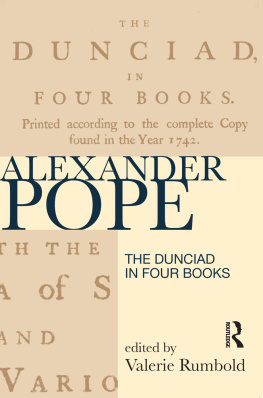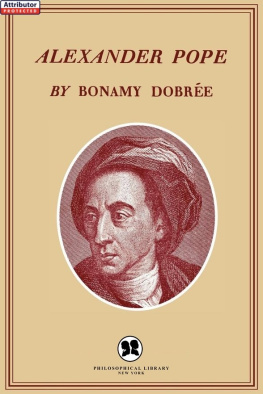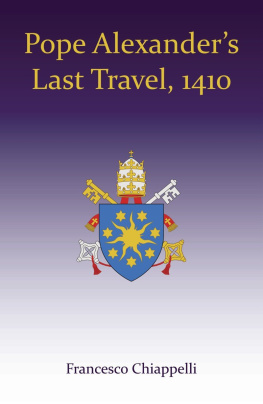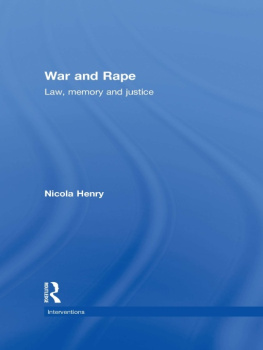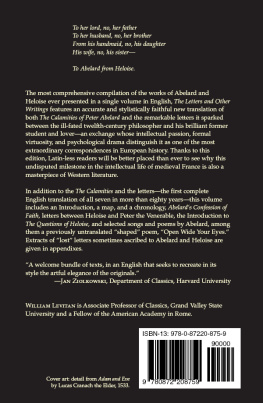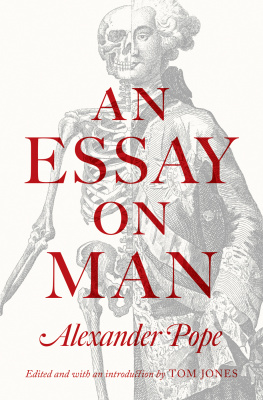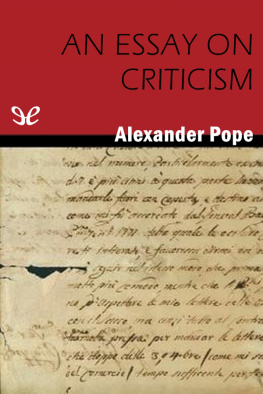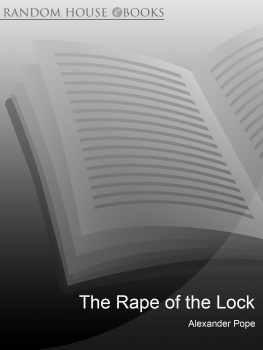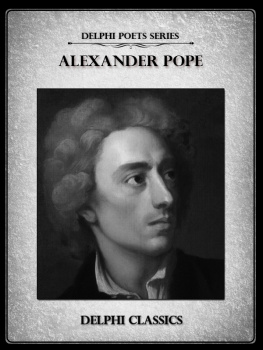ROUTLEDGE ENGLISH TEXTS GENERAL EDITOR JOHN DRAKAKIS
ALEXANDER POPE
Selected Poetry and Prose
ROUTLEDGE ENGLISH TEXTS
GENERAL EDITOR JOHN DRAKAKIS
WILLIAM BLAKE:
Selected Poetry and Prose ed. David Punter EMILY BRONT:
Wuthering Heights ed. Heather Glen JOHN CLARE:
Selected Poetry and Prose ed. Merryn and Raymond Williams JOSEPH CONRAD:
Selected Literary Criticism and The Shadow-Line ed. Allan Ingram CHARLES DICKENS:
Hard Times ed. T.W. and R.J.Craik HENRY FIELDING:
Joseph Andrews ed. and R.J.Craik HENRY FIELDING:
Joseph Andrews ed.
Stephen Copley BEN JONSON: The Alchemist ed. Peter Bement ANDREW MARVELL: Selected Poetry and Prose ed. Robert Wilcher JOHN MILTON: Selected Poetry and Prose ed. Tony Davies WILFRED OWEN: Selected Poetry and Prose ed. Jennifer Breen ALEXANDER POPE: Selected Poetry and Prose ed. Robin Sowerby Forthcoming
| Robert Browning | Selected Poetry ed. Aidan Day |
| Geoffrey Chaucer | The Wife of Baths Prologue and Tale and The Clerks Prologue and Tale ed. Marion Wynne-Davies |
| Joseph Conrad | Heart of Darkness ed. John Batchelor |
| George Eliot | The Mill on The Floss ed. Sally Shuttleworth |
| Thomas Hardy | The Mayor of Casterbridge ed. J.Bullen |
| Gerard Manley | Hopkins Selected Poetry and Prose ed. R.J.Watt |
| James Joyce | Dubliners ed. Stan Smith |
| D.H.Lawrence | Selected Poetry and Prose ed. John Lucas |
| Christopher Marlowe | Dr Faustus ed. John Drakakis |
| Mary Shelley | Frankenstein ed. Patrick Lyons |
| Percy Bysshe Shelley | Selected Poetry and Prose ed. Alasdair Macrae |
| Edmund Spenser | The Faerie Queen Book 1 and Selected Poems ed. Elizabeth Watson |
| Virginia Woolf | To the Lighthouse ed. Sandra Kemp |
| William Wordsworth | Selected Poetry ed. Philip Hobsbaum |
| W.B.Yeats | Selected Poetry and Prose ed. Graham Martin |
ALEXANDER POPE
Selected Poetry and Prose
Edited by
Robin Sowerby
11 New Fetter Lane,
London EC4P 4EE This edition published in the Taylor & Francis e-Library, 2003.
Published in the USA by Routledge in association with Routledge, Chapman & Hall, Inc.
29 West 35th Street,
New York NY 10001Introduction, Critical commentary, and Notes 1988 Robin SowerbyAll rights reserved. Title II. Title II.
Sowerby, Robin (Routledge English texts).
828.509 PR3622 ISBN 0-203-20029-2 Master e-book ISBN
ISBN 0-203-20032-2 (Adobe eReader Format)
ISBN 0-415-00665-1 (Print Edition) Library of Congress Cataloging in Publication Data Pope, Alexander, 16881744.
Selected poetry and prose.(Routledge English texts)
Bibliography: p.I. Sowerby, Robin. II. Title. III. (An Epistle to Dr Arbuthnot, 1278)
He considered poetry as the business of his life; and, however he might seem to lament his occupation, he followed it with constancy; to make verses was his first labour and to mend them was his last. (An Epistle to Dr Arbuthnot, 1278)
He considered poetry as the business of his life; and, however he might seem to lament his occupation, he followed it with constancy; to make verses was his first labour and to mend them was his last.
Alexander Pope, born in 1688, the only son of moderately well-to-do Catholic parents (his father was a linen merchant) had a London childhood in comfortable circumstances. His family moved to Binfield in Windsor Forest when he was about 12. He was educated partly by priests in the home, then at a Catholic school in Twyford near Winchester, and subsequently under the tutelage of a former fellow of University College Oxford who had set up a school near Marylebone. His youthful literary endeavours were encouraged by his father and fostered by influential friends. His first publications (The Pastorals in 1709, An Essay on Criticism in 1711 and the first version of The Rape of the Lock in 1712) brought him immediate fame and success. In this period he made a number of enduring friendships with leading literary figures like the satirist Jonathan Swift, John Gay, author of The Beggars Opera, Thomas Parnell, a poet who later gave him scholarly help with his Homer, and Dr John Arbuthnot, man of letters and the Queens physician.
Together they were members of an association calling itself the Scriblerus Club designed in Popes words to ridicule all the false tastes in learning under the character of a man of capacity enough [Martinus Scriblerus] that dipped into every art and science but injudiciously in each. Later Popes Dunciad (1728) and Swifts Gullivers Travels (1726) doubtless owe much to this earlier association. The great preoccupation of Popes life from 1714 when he started translating the Iliad to 1726 when the final volumes of the Odyssey were published was his translation of Homer. On the proceeds of subscriptions to the project (advance payments made to the poet and his publisher by those who wished to see Homer in modern English and had faith in Popes ability to prove adequate to the task) he became financially secure and therefore independent of aristocratic patronage and free to shape the course of his literary career. In addition to the rewards of recognition and success both tangible and intangible, Pope had to endure critical attack from the beginning. In the preface to an edition of his Works in 1717, he declared: The life of a wit is a warfare upon earth, and in the early eighteenth century that warfare was often prosecuted with a ferocity that may surprise and shock us in the twentieth.
The malignant spirit of many of the attacks against Pope is illustrated by Dr Johnson in a quotation from John Dennis, no mere literary hack but a leading critic of the day, who later attacked The Rape of the Lock but who is here writing about An Essay on Criticism: Let the person of a gentleman of his parts be never so contemptible, his inward man is ten times more ridiculous; it being impossible that his outward form, though it be that of a downright monkey, should differ so much from human shape as his unthinking immaterial part does from human understanding. As a boy Pope had contracted a form of tuberculosis which resulted in curvature of the spine and stunted growth so that he was never more than 4 feet 6 inches tall. This condition worsened with age and entailed physical pain and dependence upon others. In the Epistle to Dr Arbuthnot he speaks of this long disease, my life (1. 132). 353)) and much play was made with the letters of his name, A.P..E. 353)) and much play was made with the letters of his name, A.P..E.
He had the support of friends, but was always a controversial figure in the literary life of his times. Even the Homer translation involved him in controversy when he quarrelled with the more genial figure of Joseph Addison over the latters promotion of a rival (and inferior) version of the first book of the Iliad published by his protg Thomas Tickell. His private response was to compose the portrait of Atticus later included in


